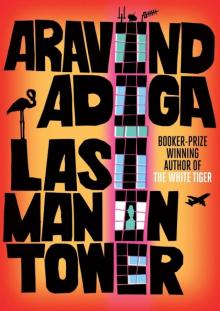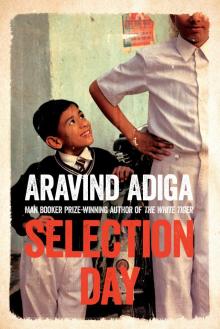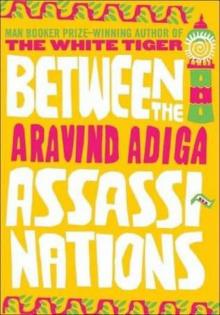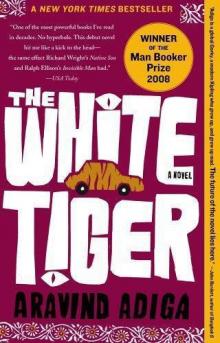- Home
- Aravind Adiga
The White Tiger: A Novel Page 6
The White Tiger: A Novel Read online
Page 6
Mr. Ashok seemed to find this amusing. “Only in India,” he said. “Your driver can also make sweets for you. Only in India. Start from tomorrow.”
“Not so fast,” Mukesh Sir said. “First we have to ask about his family. How many are they, where they live, everything. And one more thing: how much do you want?”
Another test.
“Absolutely nothing, sir. You’re like a father and mother to me, and how can I ask for money from my parents?”
“Eight hundred rupees a month,” he said.
“No, sir, please—it’s too much. Give me half of that, it’s enough. More than enough.”
“If we keep you beyond two months, it’ll go to one thousand five hundred.”
Looking suitably devastated, I accepted the money from him.
Mukesh Sir was not yet convinced about me. He looked me up and down and said, “He’s young. Don’t we want someone older?”
The Stork shook his head. “Catch ’em young, and you can keep ’em for life. A driver in his forties, you get, what, twenty years of service, then his eyes fail. This fellow will last thirty, thirty-five years. His teeth are solid, he’s got his hair, he’s in good shape.”
He sucked on his betel juice, which was filling up his mouth, turned, and spat out a jet of red liquid to the side.
Then he told me to come back in two days.
He must have phoned his man in Laxmangarh. And then that man must have gone and spoken to Kusum, and asked the neighbors about us, and phoned back: “He’s got a good family. They’ve never made any trouble. Father died some years ago of TB. He was a rickshaw-puller. Brother is in Dhanbad too, a worker in the tea shops. No history of supporting Naxals or other terrorists. And they don’t move about: we know exactly where they are.”
That last piece of information was very important. They had to know where my family was, at all times.
I have not told you yet, have I, about what the Buffalo did to his domestic servant. The one who was supposed to guard his infant son, who got kidnapped by the Naxals and then tortured and killed. The servant was one of our caste, sir. A Halwai. I had seen him once or twice when I was a boy.
The servant said he had nothing to do with the kidnapping; the Buffalo did not believe him and got four of his hired gunmen to torture the servant. Then they shot him through the head.
Fair enough. I would do the same to someone who let my son get kidnapped.
But then, because the Buffalo was sure that the man had deliberately let the child be kidnapped, for money, he also went after the servant’s family. One brother was set upon while working in the fields; beaten to death there. That brother’s wife was finished off by three men working together. A sister, still unmarried, was also finished off. Then the house where the family had lived was surrounded by the four henchmen and set on fire.
Now, who would want this to happen to his family, sir? Which inhuman wretch of a monster would consign his own granny and brother and aunt and nephews and nieces to death?
The Stork and his sons could count on my loyalty.
When I came back, the Nepali guard opened the gate without a word. I was inside the compound now.
As far as masters go, Mr. Ashok, Mukesh Sir, and the Stork were better than nine in ten. There was always enough food in the house for the servants. On Sundays you even got a special dish, rice mixed with small red chunks of boneless chicken. I had never had a regular chicken dish in my life until then; it made you feel like a king, eating chicken Sunday after Sunday and then licking your fingers. I had a covered room to sleep in. True, I had to share it with the other driver, a grim-looking fellow named Ram Persad, and he had the nice big bed, while I had to sleep on the floor—still a covered room’s a covered room, and much nicer than sleeping on the road, as Kishan and I had been doing all the time we were in Dhanbad. Above all, I got the thing that we who grow up in the Darkness value most of all. A uniform. A khaki uniform!
The next day I went to the bank—the one that had a wall made all of glass. I saw myself reflected in the glass panes—all in khaki. I walked back and forth in front of that bank a dozen times, just gaping at myself.
If only they had given me a silver whistle, I would have been in paradise!
Kishan came once a month to see me. Kusum had decided that I could keep ninety rupees a month for myself: the rest would go straight to Kishan—who would send it straight to her, in the village. I gave him the money every month through the black bars of the rear gate, and we would talk for a few minutes before the Nepali shouted, “That’s enough—the boy has work to do now!”
The work of a number two driver was simple. If the number one driver, Ram Persad, was busy driving the masters around town in the Honda City, and someone in the house wanted to go to the market, or to a coal mine, or to the train station, I got into the Maruti Suzuki and drove them there. Otherwise I had to stay around the house and make myself useful.
Now, I say they took me on as their “driver.” I don’t exactly know how you organize your servants in China. But in India—or, at least, in the Darkness—the rich don’t have drivers, cooks, barbers, and tailors. They simply have servants.
What I mean is that anytime I was not driving the car, I had to sweep the floor of the courtyard, make tea, clean cobwebs with a long broom, or chase a cow out of the compound. There was one thing I was not allowed to do, and this was to touch the Honda City: Ram Persad alone had the right to drive it and clean it. In the evenings I’d watch him wash the sleek exterior of the car with a soft cloth. And I’d burn with envy.
I could see, even from outside, that this was a beautiful, modern car, with all the necessary comforts: a speaker system, A/C, nice glossy leather seats, and a big stainless-steel spittoon in the back. It must be like paradise to drive such a nice car. All I had was a battered old Maruti Suzuki.
One evening, as I was watching, Mr. Ashok came and poked his nose around the car. I was discovering that he was a very inquisitive man.
“What’s that for? That shiny thing in the back.”
“Spittoon, sir.”
“What?”
Ram Persad explained. This spittoon was for the Stork, who liked to chew paan. If he spat the paan out the window the paan might streak the sides of the car, so he spat near his feet, into the spittoon, which the driver washed and cleaned at the end of every ride.
“Disgusting,” Mr. Ashok said.
He was asking about something else when Mukesh Sir’s son Roshan came running up to us with a plastic bat and ball in his hand.
Ram Persad snapped his fingers for me.
(Playing cricket with any brat in the household who wanted to play—and letting him win, handsomely—was one of the prescribed duties of driver number two.)
Mr. Ashok joined the game. He stood as the wicket-keeper while I bowled full tosses to the brat.
“I’m Azharuddin, captain of India!” the boy shouted every time he hit a six or a four.
“Call yourself Gavaskar. Azharuddin is a Muslim.”
It was the Stork. He had come into the courtyard to watch.
Mr. Ashok said, “Father, what a silly thing to say! Hindu or Muslim, what difference does it make?”
“Oh, you young people and your modern ideas!” the Stork said. He put his hands on me. “I have to steal the driver, Roshan—I’m sorry, you’ll have him back in an hour, okay?”
The Stork had a special use for driver number two. He had bad legs, with blue veins in them, and had been told by a doctor to sit in the courtyard in the evening with his feet in warm water and have them massaged by a servant.
I had to heat water on the stove, carry it into the courtyard, and then lift the old man’s feet up one after the other and immerse them in the hot water and then massage them both gently; as I did this, he would close his eyes and moan.
After half an hour, he would say, “The water’s gone cold,” and then I had to lift his feet out, one at a time, from the bucket, and carry the bucket in to the toilet. The w
ater in it was dark—dead hair and bits of skin floated on it. I had to fill the bucket with fresh hot water, and bring it back.
As I was massaging, the two sons pulled up chairs and sat down by their father to talk. Ram Persad would bring out a bottle full of a golden liquid, and pour it into three glasses, and drop ice cubes in their glasses, and hand one glass to each of them. The sons would wait for the father to take the first sip and say, “Ah…whiskey. How would we survive this country without it,” and then the talking would start. The more they talked, the faster I massaged. They talked about politics, coal, and about your country—China. Somehow these things—politics, coal, China—were linked to the family fortunes of the Stork; and dimly I understood that my own fate, since I was part of this family now, was linked into these three things as well. The chatter of coal and China got mixed up with the aroma of whiskey from the glasses, the stench of sweat rising up from the Stork’s feet dipped in the warm water, the flakiness of his skin, and the light jabs of the sandaled feet of Mr. Ashok or the Mongoose when they bumped into my back in the process of moving about. I absorbed everything—that’s the amazing thing about entrepreneurs. We are like sponges—we absorb and grow.
A sharp blow landed on my head.
I looked up and saw the Stork, with his palm still raised over my skull, glaring at me.
“Know what that was for?”
“Yes, sir,” I said—with a big smile on my face.
“Good.”
A minute later he hit me on the head again.
“Tell him what it was for, Father. I don’t think he knows. Fellow, you’re pressing too hard. You’re too excited. Father is getting annoyed. Slow down.”
“Yes, sir.”
“Do you have to hit the servants, Father?”
“This is not America, son. Don’t ask questions like that.”
“Why can’t I ask questions?”
“They expect it from us, Ashok. Remember that—they respect us for it.”
Now, Pinky Madam never joined in these conversations. Except to play badminton with Ram Persad, which she did wearing dark glasses, she never left her room. I wondered what was going on with her—was she having a fight with her husband? Was he not sticking it to her well in bed?
When the Stork said, “The water’s gone cold,” for the second time, and took his feet out of the bucket, my work was done.
I splashed the cold water down the sink.
I washed my hands for ten minutes, and dried them, and washed them again, but it made no difference. No matter how much you wash your hands after you have massaged a man’s foot, the smell of his old, flaky skin will stay on your skin for an entire day.
There was only one activity that servant number one and servant number two had to do together. At least once a week, around six o’clock, Ram Persad and I left the house and went down the main road, until we got to a store with a sign that said:
“JACKPOT” ENGLISH LIQUOR SHOP
INDIAN-MADE FOREIGN LIQUOR SOLD HERE
I should explain to you, Mr. Jiabao, that in this country we have two kinds of men: “Indian” liquor men and “English” liquor men. “Indian” liquor was for village boys like me—toddy, arrack, country hooch. “English” liquor, naturally, is for the rich. Rum, whiskey, beer, gin—anything the English left behind. (Is there a “Chinese” liquor, Mr. Premier? I’d love to take a sip.)
One of the most important duties of driver number one was to come to Jackpot once a week and buy a bottle of the most expensive whiskey for the Stork and his sons. It was part of servant protocol, though don’t ask me why, that the junior driver accompany him on this outing. I guess I was supposed to make sure he did not run away with the bottle.
Colored bottles of various sizes were stacked up on Jackpot’s shelves, and two teenagers behind the counter struggled to take orders from the men shouting at them. On the white wall to the side of the shop, there were hundreds of names of liquor brands, written in a dripping red paint and subdivided into five categories, BEER, RUM, WHISKEY, GIN, and VODKA.
PRICE LIST “JACKPOT” ENGLISH LIQUOR SHOP
OUR WHISKEY
WHISKEY FIRST CLASS
Quarter
Half
Full Bottle
BLACK DOG
—
—
1330
TEACHER’S
—
530
1230
VAT 69
—
—
1210
WHISKEY SECOND CLASS
Quarter
Half
Full Bottle
ROYAL CHALLENGE
110
220
390
ROYAL STAG
110
219
380
BAGPIPER
84
200
288
WHISKEY THIRD CLASS
Quarter
Half
Full Bottle
ROYAL CHOICE
61
110
200
WILD HORSE
44
120
200
(EVEN CHEAPER WHISKEY IS AVAILABLE: ASK AT THE COUNTER.)
OUR VODKA
VODKA FIRST CLASS…
It was a small store, and at least fifty men were crammed into the ten feet of space in front of the counter, each yelling at the top of his voice, while waving rupee notes of the higher denominations:
“Kinfisher Strong one liter!”
“Old Monk half bottle!”
“Thunderbolt! Thunderbolt!”
They were not going to be drinking this liquor; I could tell from their torn and dirty shirts that they were only servants, like Ram Persad and me, come to buy English liquor for their masters. If we came after eight o’clock on a weekend night to Jackpot, it was like a civil war in front of the counter; I had to keep the men at bay, while Ram Persad shoved his way to the counter and yelled:
“Black Dog! Full bottle!”
Black Dog was the first name in the first-class category of whiskey. It was the only thing that the Stork and his sons drank.
Ram Persad would get the liquor; and then I would swat at the other servants and fight for some space for us to get out, while he cradled the bottle in his arms. It was the only time we were ever like a team.
On our way back to the house, Ram Persad would always stop by the side of the road and slide the Black Dog out of its cardboard box. He said this was to check that Jackpot hadn’t cheated us. I knew he was lying. He just wanted to hold the bottle. He wanted to hold the full, virgin bottle of first-class whiskey in his hand. He wanted to imagine that he was buying it for himself. Then he would slide the bottle back into the cardboard box and return to the house, me behind him, my eyes still dazzled by the sight of so much English liquor.
At night, while Ram Persad snored from his bed, I lay on the floor with my head resting on my palms.
I was staring at the ceiling.
And thinking how the Stork’s two sons were as different from each other as night and day.
Mukesh Sir was small, and dark, and ugly, and very shrewd. We would have called him “the Mongoose” back at home. He had been married for some years, to a homely wife who was turning fat on schedule, after having two children, both boys. This fellow, this Mongoose, did not have his father’s body—but he had his father’s mind. If he ever saw me waste even one moment, he would shout, “Driver, don’t loiter there! Clean the car.”
“Cleaned it already, sir.”
“Then take a broom and sweep the courtyard.”
Mr. Ashok had his father’s body; he was tall, and broad, and handsome, like a landlord’s son should be. In the evenings, I saw him play badminton with his wife in the compound of the house. She wore pants; I gaped. Who had ever seen a woman dressed in trousers before—except in the movies? I assumed at first she was an American, one of those magical things he had brought home from New York
, like his accent and the fruit-flavored perfume he put on his face after shaving.
Two days later, Ram Persad and the slanty-eyed Nepali were gossiping. I took a broom, began sweeping the courtyard, and edged closer and closer to them.
“She’s a Christian, did you know?”
“No way.”
“Yes!”
“And he married her?”
“They married in America. When we Indians go there, we lose all respect for caste,” the Nepali said.
“The old man was dead set against the marriage. Her people were not happy either.”
“So—how did it happen?”
The Nepali glared at me. “Hey, are you eavesdropping on us?”
“No, sir.”
One morning there was a knocking on the door of the drivers’ quarters, and when I went out, Pinky Madam was standing with two rackets in her hand.
A net had been tied between two poles in one corner of the courtyard; she got on one side of the net and I got on the other side. She hit the shuttle—it rose up, and then fell near my foot.
“Hey! Move! Hit it back!”
“Sorry, madam. I’m so sorry.”
I’d never played this game before. I hit the shuttle back to her, and it went straight into the net.
“Oh, you’re useless. Where is that other driver?”
Ram Persad dashed up to the net at once. He had been watching the game all the time from the side. He knew exactly how to play badminton.
I watched him hit the shuttle cleanly over the net and match her shot for shot, and my belly burned.
Is there any hatred on earth like the hatred of the number two servant for the number one?
Though we slept in the same room, just a few feet apart, we never said a word to each other—never a Hello, or How’s your mother doing, nothing. I could feel heat radiate out from him all night—I knew he was cursing me and putting spells on me in his sleep. See, he began every day by bowing in front of at least twenty pictures of various gods he kept in his side of the room, and saying, “Om, om, om.” As he did this, he looked at me through the corner of his eye, as if to say, Don’t you pray? What are you, a Naxal?

 Last Man in Tower
Last Man in Tower Selection Day
Selection Day Between the Assassinations
Between the Assassinations The White Tiger
The White Tiger The White Tiger: A Novel
The White Tiger: A Novel